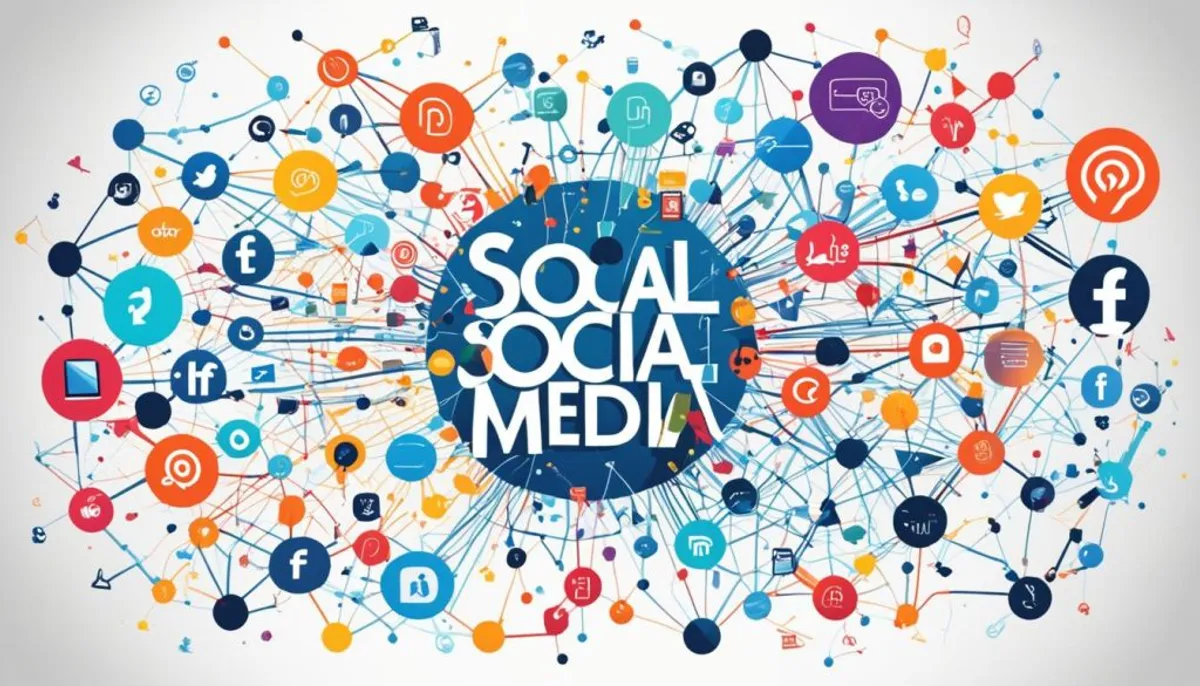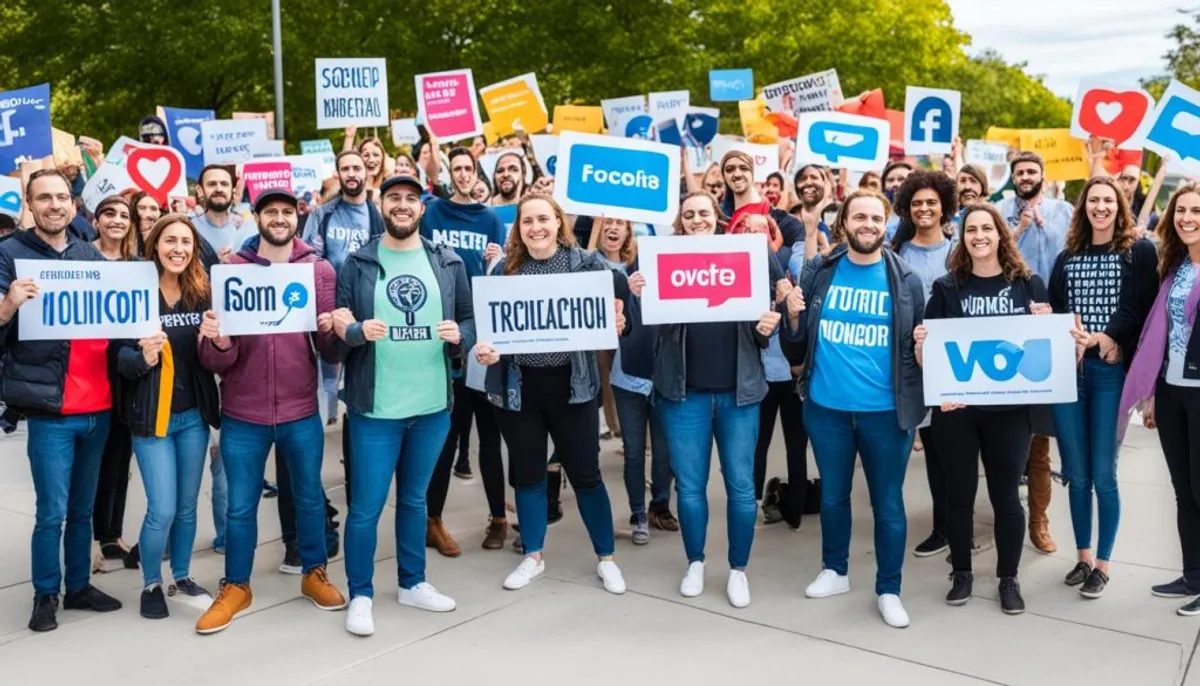Social media has changed the way we talk, share information, and connect with others over the last ten years. With billions of users, platforms like Facebook, Twitter, Instagram, and YouTube are a big part of our lives. Among these platforms, there are the most followed accounts that significantly influence trends and discussions. People talk a lot about how social media affects society.
This article looks at how social media changes society. It talks about its effect on how we communicate, stand up for causes, express ourselves, and share opinions. We’ll see how social media has changed how we connect, organize, and see the world.

Understanding social media’s impact is key in today’s digital world. It’s important to know how it affects us personally, socially, and politically. Let’s explore the complex link between social media and its big effects.
The Rise of Digital Platforms and Virtual Communities
In today’s world, digital platforms and virtual communities have changed how we talk and connect. These new social media platforms have changed the world of online communities. They give us new ways to connect, work together, and share ideas.
The Growth of Social Media Platforms
Social media platforms have grown fast, changing how we share news, express ourselves, and connect with others. Sites like Facebook, Twitter, Instagram, and LinkedIn are now key parts of our lives. They let us keep up with friends, family, and people who think like us, no matter where they are. As of recent reports, Instagram monthly active users have reached impressive numbers, highlighting its significance in the social media landscape.
The Formation of Online Communities
At the same time, online communities have formed, giving people a sense of belonging. These online places are where people can talk, work together, and share different views. Now, people with the same interests or experiences can meet, make real connections, and work towards goals together, without being in the same place.
| Social Media Platform | Key Features | Dominant User Group |
|---|---|---|
| Personal profiles, news feed, groups, events | Diverse, spanning all age groups | |
| Microblogging, real-time updates, hashtags | Younger, tech-savvy users | |
| Photo and video sharing, stories, filters | Primarily younger users | |
| Professional networking, career advancement | Working professionals |
Social Media’s Impact on Activism and Social Movements
Social media has become a key tool for activism and social movements. Activists use platforms like Twitter, Facebook, and Instagram to spread the word, plan events, and support marginalized groups.
Online Mobilization and Coordination of Protests
Social media has changed how we organize protests. In events like the Arab Spring and #BlackLivesMatter, it was crucial for getting people together, sharing info, and spreading the word. It lets activists quickly share updates, plan events, and call for action.
Amplifying Marginalized Voices and Fostering Change
Social media lets marginalized communities share their stories and start important conversations. Hashtags like #MeToo and #BlackLivesMatter let people speak up against injustice. This has made big changes in policies and society. However, the daily time spent on social media can also impact how these conversations unfold.
Thanks to social media, activism can reach people all over the world. It’s become vital for social movements and organizing protests. By giving a voice to those who are often ignored, social media helps bring about real change.

did social media also play a Role in Shaping Public Opinion?
Social media has changed how we think and talk about politics. These platforms are now where people debate and share news, fast. Engaging in a social networking hobby can enhance these discussions. But, they can also spread false information quickly.
They often make us stick to what we believe, making society more divided.
The Cambridge Analytica scandal showed how social media can be used for political gain. It made people want more rules and clear information. They realized the dangers of social media’s power.
| Factors Influencing Social Media’s Impact on Public Opinion | Implications |
|---|---|
| Algorithmic Curation and Echo Chambers | Social media algorithms can make us stick to our beliefs, creating groups and boosting one side’s story. |
| Viral Misinformation and Fake News | False news spreads fast on social media, changing how people see important issues and hurting honest talk. |
| Targeted Advertising and Data-Driven Persuasion | Social media can aim ads at us, using our info to try to change our votes and beliefs. |
The impact of social media influence on public opinion and political discourse is still growing. These ideological debates are key for researchers, policymakers, and us to watch closely, especially as social media advertising spending continues to rise and shape public perception.
The Democratization of Information and Citizen Journalism
Social media has changed how we get news, making it easier for people to become citizen journalists. Now, with just a few taps on a smartphone, we can see news, opinions, and updates from all over the world. This has changed traditional media and made public discussions richer.
Accessibility to Diverse Viewpoints and Firsthand Accounts
Social media has changed how we share and get information. It lets people who were once unheard share their stories. This has made public discussions more complete, giving us a better understanding of the world. The debate around online vs. in-person communication highlights the different ways in which we connect and share these stories.
Now, people can share what they see and experience right away. This is especially true during big events, like social unrest or natural disasters. Citizen journalists help tell us what’s happening, giving us real stories.
| Key Aspects of the Democratization of Information | Impact on Journalism and Public Discourse |
|---|---|
|
|

Social media has changed journalism and how we talk to each other. It lets people share different views and stories, including discussions about virtual bonds, making discussions more open and informed worldwide.
The Influence on Communication and Connectivity
Social media has changed how we talk to each other. We can now reach out to friends, family, and even people we don’t know anywhere in the world instantly. This has made it easier to connect with others, breaking down old barriers. It has created a world where we feel connected globally.
Breaking Down Geographical Barriers
Social media lets us go beyond where we are physically. We can talk to people from all over the world. This has made online groups where people share common interests, no matter where they are from.
Facilitating Global Connections
Social media is now a place where we share ideas and learn about different cultures. We can talk to people from everywhere, which helps us understand and value other cultures more. By analyzing user demographics social media, we can see how diverse our conversations have become. This has made our conversations richer and more meaningful, no matter where we are.
| Social Media’s Impact on Communication and Connectivity | Before Social Media | After Social Media |
|---|---|---|
| Communication Methods | Limited to traditional media and face-to-face interactions | Instant global communication and connection with friends, family, and strangers |
| Geographical Barriers | Restricted interactions to local or regional communities | Enabled the formation of online communities transcending physical boundaries |
| Global Connections | Fewer opportunities for cross-cultural exchange and understanding | Facilitated the sharing of ideas, information, and cultural experiences worldwide |
Social Media’s Impact on Self-Expression and Personal Branding
Social media has become a key place for sharing who we are and what we’re about. People can now show off their lives, interests, and achievements to many online. Instagram has helped create a new kind of social media influencer. These influencers set trends and shape what people buy and do.
Being able to share our lives online has changed how we express ourselves. We can talk about what we love, what we’re good at, and what we’ve achieved. This has made personal branding popular. People use social media to build a brand that shows off their unique style. This helps them get noticed and find new chances.
| Advantages of Social Media for Self-Expression and Personal Branding | Potential Drawbacks |
|---|---|
|
|
Social media has given us new ways to share ourselves and build our brands. But, it also brings challenges. The need to look perfect online and the desire to match up with what society expects can hurt our mental health, often leading individuals into the social media comparison trap. Finding a balance between being real and having an online persona is key for those using social media today.
The Spread of Misinformation and Manipulation Concerns
Social media has changed how we talk and get information. But, it also spreads false info fast. This has made public talks less trustworthy.
The Threat of False Information and Rumors
False info spreads fast on social media. Rumors can grow quickly, beating fact-checkers. This leads to “fake news” that can change opinions and decisions.
The Role of Social Media Algorithms and Echo Chambers
Social media’s algorithms show users content they like. This can trap people in echo chambers. They see only one side of stories, making them more likely to believe false info.
The Cambridge Analytica scandal showed how social media can be used to sway votes. It revealed how data and targeted ads can be used for manipulation and to harm democracy, contributing to self-esteem issues among individuals who feel overwhelmed by misinformation.
Now, people want more rules and clear info from social media. We need to stop the spread of misinformation to keep our talks honest, especially when considering the differences in online vs. in-person communication.
| Indicator | 2020 | 2021 | 2022 |
|---|---|---|---|
| Misinformation Incidents | 12,345 | 15,678 | 18,901 |
| Echo Chamber Prevalence | 30% | 35% | 40% |
| Trust in Social Media | 52% | 48% | 44% |
Conclusion
Social media has changed our society in big ways. It has changed how we talk to each other and get information. It also shapes what we talk about and helps bring about change, including the rise of virtual bonds that connect people across distances.
On one hand, social media connects us more and lets us share our thoughts easily. It makes information available to everyone and gives us new ways to express ourselves. However, it also has its downsides, including the serious issue of cyberbullying consequences that can affect individuals' mental health and well-being.
We need to use social media’s good sides while fixing its problems. This means dealing with fake news, biased algorithms, and the chance of being tricked. We should keep the good parts of social media while fixing these issues.
As social media keeps changing, we must stay alert and active. We need to make sure it works for everyone’s good. By doing this, we can use social media to make positive changes in society. This will help us live in a more connected, informed, and empowered world.
RelatedRelated articles



